- Home
- Jeff Mariotte
Close to the Ground Page 6
Close to the Ground Read online
Page 6
“No one, sir,” McIver replied. “Just speakin’ me mind, and they seem to agree wi’ me.”
“Speaking your mind. Taking initiative, eh?”
“Yes, sir.”
Mordractus looked hard at McIver. Holding the ruddy-faced man in his gaze, he began to describe a pattern in the air with his bony fingers.
“Sir, no —” McIver started to say, but his voice caught in his throat. He brought a hand up to his neck, as if feeling for an obstruction. His eyes started to bug out of his head, and the expression in them was pure panic.
Everyone else watched silently as he fell to the floor. He kicked a couple of times, and then was still.
“I want results,” Mordractus told them. “Not excuses. Not rationalizations. Results. Does everyone understand that now?”
For the third time there was a chorus of confirmation.
“Good,” Mordractus said. He waved them away with a backhanded flip of his fingers. “Leave me, then. And make it happen.”
When they were almost to the door, he added, in a soft voice, “There isn’t much time to waste.”
CHAPTER SIX
Jack Willits blew into the office, banging the door as he came.
It was a little after noon. Angel was sitting behind the front desk with his feet up, reading one of the magazines Cordy had found for him, a back issue of Hollywood Reporter with a profile of Jack in it. This one had come from her personal collection, but she had gone down to the library to find more. Doyle was out, too, dodging creditors or researching the Willits family, or maybe both.
“Angel, my man,” Jack said when he came in.
Angel swept his feet off the desktop and stood, wondering what the studio executive was doing in his low-rent neighborhood. He took Jack’s outstretched hand, gave it a shake. “Mr. Willits.”
“Please, just Jack.”
“Okay,” Angel said. “Jack. What brings you down here?”
“Wanted to talk to you, Angel. Without Karinna around, you know. Mano a mano, right?”
“Right, okay. About what?”
“About Karinna. And you.”
Angel was a little concerned by that. “What about us?”
“I’m a reasonably well-off man, Angel. I appreciate everything that has come my way, don’t get me wrong. But it also comes with a cost. I’m a target, and that carries over to my family. We’re all targets.”
“I’m sorry to hear that.”
“Thank you. So the long and the short of it, Angel, is that, as targets, we — especially Karinna, because she likes to have her fun — need bodyguards. Ones that I can trust. Karinna told me all about what happened last night, and I swear to you I never would have believed those guys could behave that way. If I had, I never would have hired them. You have to believe that.”
Willits seemed truly distressed by the memory of it. His lips were pressed tightly together, his eyes blinking, as if trying to hold in strong emotion of some kind.
“I believe you,” Angel finally said.
“I’m glad.”
“But where do I —?”
“I’m getting to that, Angel. I want you to take over security for my daughter. For Karinna. I want you to keep her safe from — from whatever might threaten her.”
Angel thought a moment. “I don’t know if I can do that,” he said at length. “She’s a very . . . active girl. I think she needs a team of guards, and I pretty much work alone.”
“What he means,” Cordelia announced, barging through the front door with a stack of magazines clutched to her, “is that he alone manages our staff of operatives.” She put the magazines on Angel’s desk and turned to Jack with her hand out. “My role is more of a figurehead one than a real hands-on partnership, since I’m so busy with other projects. Cordelia Chase, Mr. Willits. It is truly an honor to meet you.”
“A pleasure, Ms. Chase. You are Angel’s partner in this venture?”
“Like I said, a silent partner. I offered him some, uh, backing, when he was just getting started in the business.”
“I see.”
“But enough about that,” Cordelia went on. “Let’s talk about you. I’ll bet those fourteen years at the helm of Monument Pictures have gone by really fast, haven’t they?”
“Well, umm —”
“Especially the years you had the biggest box-office hits in the industry. What were they, ’87, ’89, and ’92? You really made Monument a powerhouse, Mr. Willits. Or can I call you Jack?”
“Sure, Jack’s fine, Miss Chase. You certainly seem to know a lot about the movie industry. Especially Monument Pictures.”
“It’s my life,” she said. “I eat it, breathe it, and sleep it.”
“Jack is just offering me a job, Cordelia,” Angel interrupted. “Bodyguarding his daughter.”
“That’s right,” Cordelia said. “And you were just about to negotiate a fair price for this job? Keeping in mind that you’ll have to pay some of our operatives overtime to keep her under round-the-clock surveillance.”
“I think you’re overestimating our capabilities, Cordy.”
She turned to Angel. “No, I am not. I’m simply taking all the circumstances into account. Who the subject is, and who her father is, and, uhh . . . who her father is . . .”
“I really would like you on our side, Angel,” Jack said.
“I’m getting the feeling that everyone would.”
“How perceptive,” Cordelia said.
“I’m prepared to offer you five hundred dollars a day.”
Angel started to protest. “I don’t think —”
“Seven-fifty, then,” Jack offered. “Not a penny more.”
Angel considered it. He felt wary of Karinna Willits — guarding her might be more trouble than it seemed at first glance. But there was Doyle’s vision. If she really was a soul in need, if there was more to her problem than bodyguards threatening to beat her up, then he couldn’t turn his back on her. Working for the family guaranteed that he’d be able to keep close tabs without arousing suspicion.
“Like I said, Mr. Willits. Jack. I don’t really have a team of guards at my disposal. What I suggest is that you keep guards you know and trust with her in the daytime, to get her to school and back, or whatever she does during the day. At night I’ll take over, and stay with her until she’s back home safely. If that sounds reasonable, then we have a deal.”
“Deal,” Jack said. He offered his hand again, and Angel pumped it twice. When he let go, Cordelia was there with her hand extended, again. Jack took it.
“Like I was saying,” Cordelia began, “the movie industry? Monument Pictures? That’s where I could really make a contribution, something that would benefit both of us. I think Angel has his feet on the ground now, he can function just fine without my day-to-day supervision. So if you think you have a place for me, I’m sure that I can rearrange my schedule to accommodate you.”
Jack laughed. “Looking for a job, is that it? Okay, Miss Chase, you’ve convinced me.”
Angel could almost see Cordelia’s heart leap in her chest. Her smile widened to the point that he was afraid she’d split her head in two.
Jack wrote something down on the back of one of his business cards, handed it to her. “Show up at this office in the morning,” he said. “Say, nine o’clock. They’ll be expecting you, and they’ll get you all set up.”
“Thank you so much, Jack,” Cordelia gushed. “You won’t regret this, I promise you.”
“I doubt very much that I will, Miss Chase.” He gave her a little bow. “I’ll see you tomorrow. On the lot.”
Kate Lockley stood before a dry-erase board in the police station’s War Room. The walls were covered with maps and schematics and drawings and photos — locations and tunnel photos and shots of broken-out bank doors. Written on the white board, in Kate’s neat handwriting, were the names and addresses of seven banks spread throughout the city. Underneath California Savings on Robinson, there were three names written in red: F. Gil
more, T. Coker, J. Doe. J. for Jane, the minor female.
“This is what we’ve got so far,” Kate said, addressing her task force of a dozen officers. Some of them were in uniforms, others were plain-clothed detectives. Kate’s task force. “It’s not much. The crew tunnels into the banks during the night hours, when they’re closed. Our experts guess that it takes them four to six nights of steady work to dig their tunnels. This also jibes with the timing of the robberies.”
One of the uniforms raised his hand. “Detective Lockley?”
“Yes, Ybarra?”
“Is there any identifiable pattern to the kinds of places where the tunnels originate?”
“Good question,” Kate said. “Not so far, unfortunately. At California Savings, they had rented a garage on the other side of the block and started it there. At First Western, it was a basement apartment across the street. The only point of similarity is that the spaces are always somewhat isolated, and that’s probably a matter of not wanting their efforts to be heard.
“At any rate,” she continued, “they dig for their four or six nights or whatever. They finish up when they’re almost through the walls, usually into or adjacent to the bank’s main vault. This causes us to believe that they might have some kind of inside information — who would know where the vaults were located, in all these different banks?
“On the big night they punch through the last bit of wall into the bank. They get into the vault — sometimes they’ve dug right into it, other times they blow the door with a little bit of C-four. This is another point to consider — where do they get the plastique, and where’d they get the expertise to do all this? Keep that in mind. Anyway, they go in, they load up big bags with cash, and then, rather than carrying the awkward bags back through the elaborate tunnel system, they go out the bank’s front door into a waiting car. At this point they don’t care about the alarms — they’re gone.
“This is what happened to our three victims. Mr. Gilmore, Mr. Coker, and our unidentified minor were apparently out on the street, quite late. They were in front of, or close to, the bank doors when the crew came out. This is confirmed by security cameras that were taping the doorway. The crew charged through the door, and one of them, seeing the witnesses, opened fire with an automatic weapon. He fired a burst into each victim, and then they all got into the waiting vehicle and they drove away.
“The killings, as far as I can determine, were completely unnecessary. These people are cautious. They wear leather masks and gloves at all times while on the job. They carry automatic weapons even when they don’t expect to be seen or heard. They have developed a very elaborate system of —”
The door to the War Room opened, and a man swaggered in, dressed in an expensive blue suit, a white shirt, and a striped tie. His black hair was close-cropped and neatly combed. His teeth were white and straight.
Kate cringed inwardly. Glenn Newberry. He was a Fed. Even if she hadn’t met him before, she’d know that on sight. But she knew him, so her preconceived notion of him wasn’t just based on his job, it was based on his personality. Or lack thereof.
“Thanks for gathering the troops, Detective,” he said. He walked to the front of the room, shouldering Kate aside. She held her ground.
“We were just going over —”
“Yes, well, let’s talk about where we go from here,” he interrupted. “I want the uniforms to recanvass the neighborhood around the garage where the California Savings tunnel originated. And I —”
“Excuse me, Special Agent Newberry. This is an LAPD operation. If you’d like to observe, you’re welcome to, but you’re in no position to dictate strategy or assignments to my task force.”
He looked at her, his green eyes holding her gaze. “Would you please step outside with me, Detective Lockley?” he asked.
“Certainly.”
They left the War Room and stood close together in the hallway outside. He leaned in toward her, violating her personal space.
“These are banks, Lockley,” he said. “Insured by the Federal Deposit Insurance Corporation. Maybe you’ve heard of it. Bank robbery is a federal crime, and that puts me in charge of this task force.”
What a dweeb. She gritted her teeth, reminding herself that diplomacy with these guys was more effective than kicking the stuffing out of them.
“People are dead, Special Agent Newberry. Citizens of the city of Los Angeles. That makes this crew my job, my responsibility. You can catch the bank robbers if you want. I’m aiming to catch some killers.”
“I’ll be talking to your captain, Lockley, and we’ll see where we end up.”
“Talk all you want, Newberry. I’m confident of my jurisdiction here.”
“Your jurisdiction is one thing, Lockley. The collar is something else altogether. And when I’m handcuffing these mooks, you’ll be standing on the sidelines watching.”
“Collar?” Kate asked. “Do you have something?”
Newberry smiled.
Smug, self-righteous creep, Kate thought.
“If you’ve got something on these guys, you need to share that with me,” she said. “I’m running a task force here. We’ve got killers running around the city, and we need to rein them in.”
“If I had anything I thought would help you, I’d share it,” Newberry said. “You’d do the same for me, right?”
“Of course. I don’t care who makes the collar, I just want this crew brought down.” Which was a lie, she knew. She wanted the collar. And she wanted Special Agent Newberry to go back to Quantico and learn some manners.
Her dad had been a cop, and she’d been a cop, long enough to know that the best way to track down these bank robbers was for the P.D. and the FBI to cooperate. But she couldn’t bring herself to let go of the case, and sharing anything with this slug was repugnant to her.
“Well, that’s good to know, Detective,” Newberry said. “I’m very glad to hear that.”
The whole situation made her feel selfish and greedy. She didn’t like it, didn’t really care for the way it made her see herself, like gazing into a fun-house mirror and seeing someone who looked like herself but distorted and ugly.
Except the difference is, she thought, what I’m seeing is really me.
“I’ll be counting on you, Special Agent Newberry,” she said. Twisting the knife in her own heart. “You come up with anything, you know where to find me, right?”
“I’ll find you,” he promised. He walked away, down the hall.
She went back into the War Room. The gathered officers looked questioningly at her. “Okay,” she said. “Where were we before we were so rudely interrupted?”
There was a round of laughter. Kate basked in it.
“This is a Los Angeles Police Department task force,” she went on. Scattered applause. She let it die down. “And it will remain one. We should cooperate with the FBI whenever possible — the goal here is to catch these guys, and it doesn’t matter who does it as long as they’re caught.”
“That’s the spirit,” someone said.
“Keep in mind that they’ve graduated from bank robbers to killers,” Kate continued. “They should be considered armed and very dangerous. Now, here’s where we go from here. . . .”
Thirty minutes later she was alone in the War Room. She’d sent the task force members out on their assignments, and she stayed behind. She walked slowly around the room, looking at the charts, the maps, the photos. Every now and then she looked at the names she’d written on the board.
There was a large map of L.A. on one wall with stickpins at the site of each robbery. She stared at the map, then let her eyes drift out of focus, hoping to see a pattern where there was none.
But the problem with that was, there was none. Whoever these guys were — and she used the word intentionally, as the bank cameras had shown that they were all male — they were smart enough to randomize their activities.
They knew that the way criminals were usually caught was by becoming predictable. So t
hey did their crimes the same way each time, but there was nothing — besides the obvious fact that the targets were all banks — in common about where they chose to do them. It did the police no good at all to know that a tunnel was being dug somewhere, if there was no clue as to where that somewhere might be.
And they had been remarkably adept at leaving no clues behind. No fingerprints, no DNA. Even digging the tunnels they had worn gloves and used cheap tools easily bought at any of dozens of hardware warehouse stores around the Southland. Broken tools, left behind, provided no information. She had assigned two officers to check out all the home improvement and hardware stores, just in case — these guys did, after all, seem to go through a lot of shovels and picks. But she held out little hope there.
No, when this crew was caught, it was going to be because they made a mistake. And so far, they had only made one.
Killing three people.
It was a mistake because it made Kate Lockley want them. When they’d just been robbing banks, she’d been concerned but not particularly involved. She would have been happy to let the Feds have it.
When they became killers, she was sucked in.
When she was seven and wanted a Barbie, she had insisted, begged, pleaded, cajoled, whined. Her dad had finally relented, telling her that she was as tenacious as a bulldog. For a few weeks he’d called her that. It wasn’t a nickname that stuck, and they’d moved on to others.
But the bulldog spirit, that stuck. She knew tenacity carried the day. If others called her stubborn, so be it.
Kate wanted these crooks, and she’d have them.
Simple as that.
CHAPTER SEVEN
Dinner was at eight.
Jack Willits wouldn’t leave Angel’s office without a promise from Angel that he’d be there. When he did go, Angel thought he’d have to peel Cordy off the ceiling, she was flying so high from Jack’s offer of a job at Monument Pictures.
In fact, she was more calm than he’d expected — so calm, in fact, that it was several minutes before he realized that what she really was, was terrified. He tried to broach the subject a couple of times, but her reaction caused him to think she needed some time to take it all in.

 City Under the Sand
City Under the Sand The Burning Season
The Burning Season Sanctuary
Sanctuary Winds of the Wild Sea
Winds of the Wild Sea Serpents in the Garden
Serpents in the Garden Close to the Ground
Close to the Ground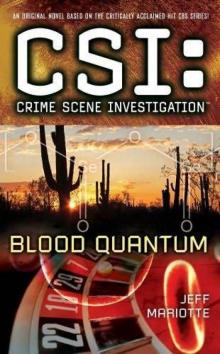 Blood Quantum
Blood Quantum Brass in Pocket
Brass in Pocket City Under the Sand: A Dark Sun Novel (Dungeons & Dragons: Dark Sun)
City Under the Sand: A Dark Sun Novel (Dungeons & Dragons: Dark Sun)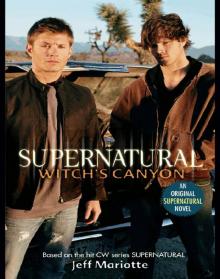 Witch's Canyon
Witch's Canyon STAR TREK: The Lost Era - 2355-2357 - Deny Thy Father
STAR TREK: The Lost Era - 2355-2357 - Deny Thy Father Dawn of the Ice Bear
Dawn of the Ice Bear The Xander Years, Vol.2
The Xander Years, Vol.2 Ghost of the Wall
Ghost of the Wall 30 Days of Night: Light of Day
30 Days of Night: Light of Day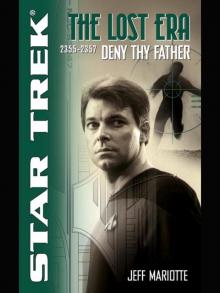 Deny Thy Father
Deny Thy Father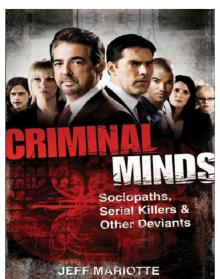 Criminal Minds
Criminal Minds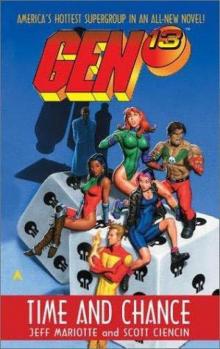 Time and Chance
Time and Chance The Folded World
The Folded World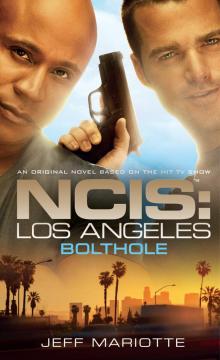 Bolthole
Bolthole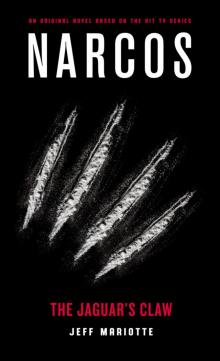 Narcos
Narcos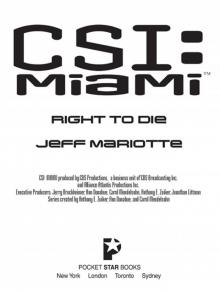 Right to Die
Right to Die